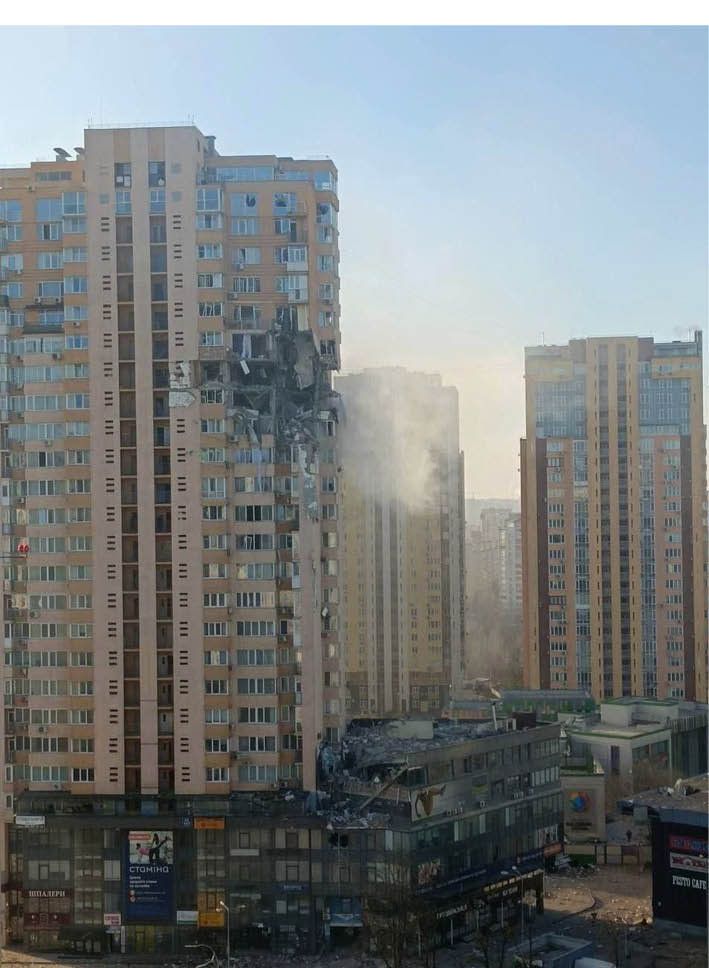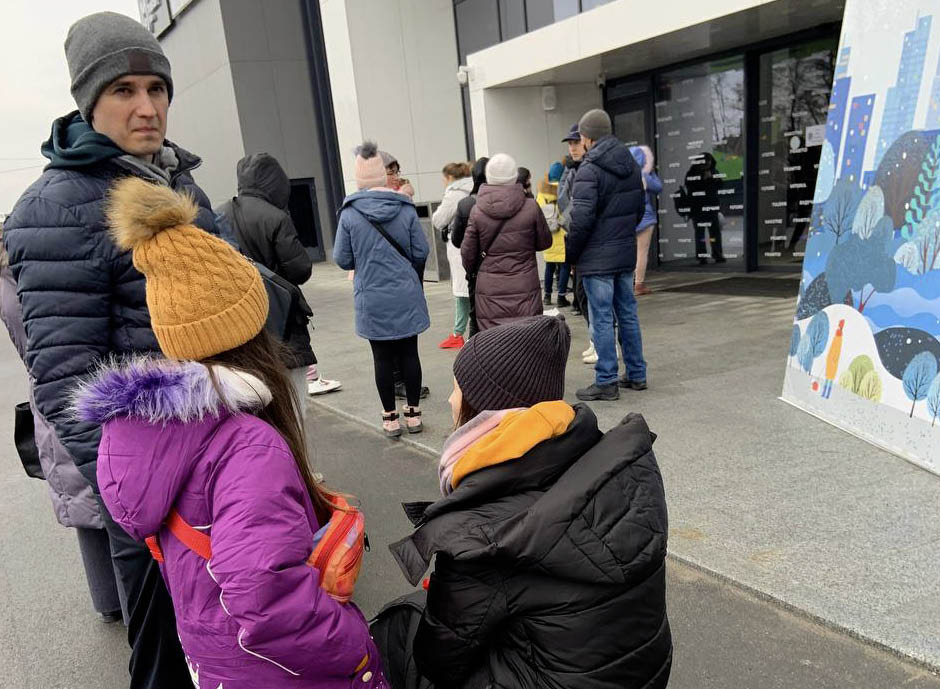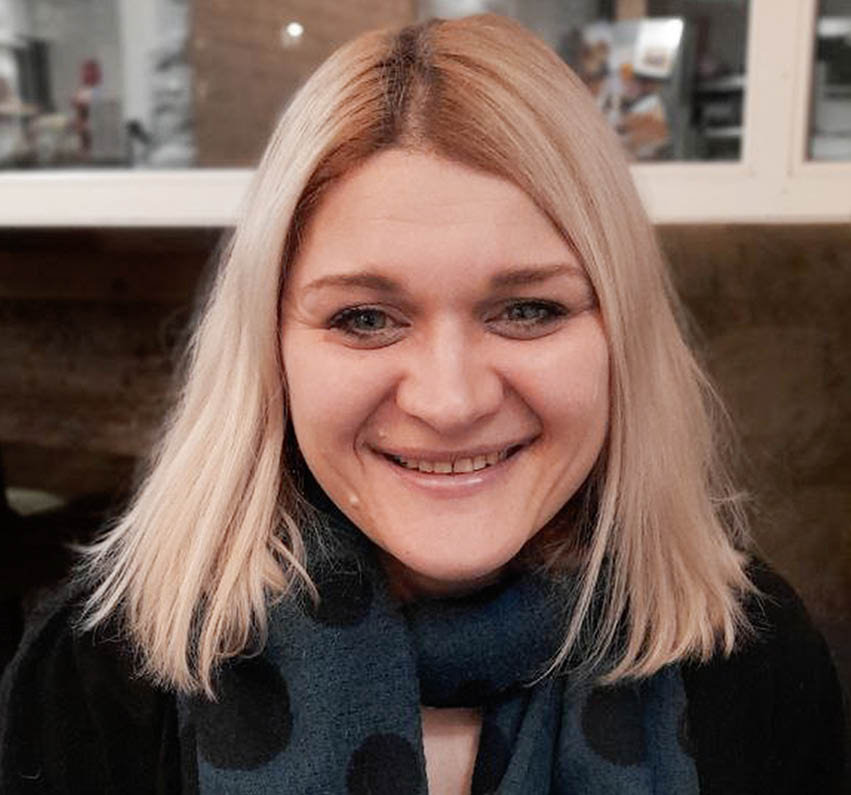You were in Kyiv when the war started. Can you tell us about the events of 24 February?
On 16 February we still didn’t expect the Russians to invade Ukraine. I remember friends from the United States calling me and begging me to escape, but to us, a war didn’t seem a possible scenario. On 20 February we were still at our workplace, joking among colleagues about this war everyone was talking about. We were expecting something like in 2014, which was nothing like what was about to happen. On 24 February, I had slept with an open window, there was a loud sound like from an explosion. I woke up, it was half past four in the morning, and I remember thinking: “Oh, is this the war?” I still wasn’t sure, I remember a dog barking, and when I saw the sky which was not grey like a normal sky in a big city would be, but red and white and full of strange lights, it dawned on me. A part of me finally realized that it meant war.
What did you do?
My emergency bag was already packed, and I got dressed. About six in the morning, a friend called, telling me that the airport had been bombed. I live close to the city’s other airport, so I thought, okay, I was lucky, the next airport could be this one. I went to tell my cousins who live in the same building, and for a couple of hours we were just waiting. We didn’t really know what to do, so we went to the shop and bought some groceries. Then we heard shooting in the streets, and we went down to the basement. There’s a lot of bomb shelters in Kyiv, but we were too scared to get outside and run the distance of a few blocks. I started to call my friends who lived in Kharkiv and told them to come to Kyiv. When they asked me what I was planning to do, I said I would leave and go to Europe.
What about your family?
My parents still live in the small town near Kyiv where I was born. They stayed there. My father is ill, he has terminal cancer, but he is not scared. He’s a very brave man. He tries to cheer up my mother who is not coping so well, he plays the guitar to her and makes jokes. Together they help the refugees from Eastern Ukraine. There are a lot in the central area of the country.
How did you get out?
I waited for my friends from Kharkiv who wanted to leave, and they told me they had seen the tanks on the way to Kyiv. The problem was the fuel. There were already long queues at the ATMs, and you were allowed only 20 litres of fuel. So, we decided to wait and leave in the morning of 25 February. It would have been an 8-10-hour-ride to Poland. I was still hiding in the basement, when they called again, in a hurry. And they said, now or never. We are leaving, you have 15 minutes to decide if you want to come with us. So I took my emergency kit and my laptop, and they picked me up.
It took forever. We got stuck in traffic jams all the time, moved forward only 13 kms in 3 days, we saw tanks and military passing, the first roadblocks. Later, outside the capital, there were petrol stations raided in search of fuel, cars abandoned at the curb. My relatives called to tell me I had done the right thing, Kyiv had already run out of fuel, so they were stuck. We spent five days in traffic chaos, just driving, seven people in two cars. Some of my friends were Ukrainians, others were foreigners from Nigeria with a permit to stay in Ukraine – so they were allowed to leave. We basically lived in the car for the following five days, the first 48 hours without sleeping, no food, no water, we just wanted to go, go, go. And when you’re stuck in traffic most of the time it is unnerving. We brushed our teeth on the highway, people living in the territories we crossed came and brought us food, some people prepared the food in the surrounding woods. Drones were hovering above us, and they made us feel uncomfortable because we feared that they would attack us. After a couple of days, we felt quite dirty, so we gave the locals money to take a shower at their houses.
Do you hear from your parents?
Every morning I call my parents and ask my father: “Are you alive?” And he’s like, “Yes.”

A residential building near Kyrychenko’s apartment, a couple of days after 24 February. Half of her colleague’s apartment has been bombed. She just had taken out a loan. © Nataliia Kyrychenko
How is the current situation in Kyiv?
According to the news, it is getting better. But according to my friends who stayed there, it is not. There’s food and medicine shortages. Everyone has this app that informs you of the air raids, like the sirens. Some of my friends half-jokingly said they’d turn it off to sleep at least a little while. I used to work with a woman who lived nearby. She had just taken out a loan, and she and her family were lucky: they were all in the hallway when the bombs hit and took away half of the flat. But I learned how to avoid dying from a bomb: you must look for a second wall, not hide behind the first one – so the second wall absorbs the impact from the first wall crushing against it and you’re safe. Our sense of humour helps, too. A friend of mine wrote to me, referring to the bombing that had diminished or at least couldn’t be heard as loud as before: “They’re probably bombing the woods now.”
Did you expect this to happen? Is it Putin’s or the Russians’ war?
When my employer asked me some time ago if there would be a war, I answered yes. But I wouldn’t have thought to this extent. People in Kyiv are quite well-informed, but outside, in the rural areas, people have more prejudices. I still think it is Putin’s war, but there’s a lot of propaganda going on. I have relatives in Russia. Of course, they don’t want people to die, but they are heavily influenced by Putin’s propaganda. And I think a lot of people believe him.
Don’t you get angry at the rest of the world that’s just watching?
No. I appreciate what countries like Germany, Italy and Poland do. They help.
Do you feel safe where you live now?
I am still afraid of jet sounds. I haven’t been able to unpack my suitcase for two weeks. I didn’t expect to be that traumatized, but still, when I hear the test alarm of the siren here every Saturday, I am terrified.

Queue at the ATM on 24 February 2022. © Nataliia Kyrychenko




